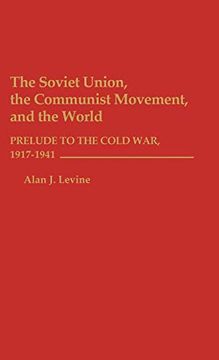Share
The Soviet Union, the Communist Movement, and the World: Prelude to the Cold War, 1917-1941 (in English)
Alan Levine (Author)
·
Praeger
· Hardcover
The Soviet Union, the Communist Movement, and the World: Prelude to the Cold War, 1917-1941 (in English) - Alan Levine
$ 108.57
$ 135.71
You save: $ 27.14
Choose the list to add your product or create one New List
✓ Product added successfully to the Wishlist.
Go to My WishlistsIt will be shipped from our warehouse between
Monday, June 17 and
Tuesday, June 18.
You will receive it anywhere in United States between 1 and 3 business days after shipment.
Synopsis "The Soviet Union, the Communist Movement, and the World: Prelude to the Cold War, 1917-1941 (in English)"
In this volume, Alan Levine traces the development of the Soviet Union and the Communist movement from 1917 to the Nazi invasion of the USSR in June 1941. Arguing that the Cold War between the Soviet Union and the Western democracies can only be fully understood by examining the doctrine and practices of the Soviet Union and the world Communist movement from their inception, Levine offers a detailed account of the development of the state parties in Russia and China, the Communist seizure of power, the Soviet Union's role in international relations between the two world wars, and the development of the techniques of conflict management used by the Communist powers later in the era of the Cold War. By treating together a number of topics and elements that are closely related but usually treated separately, Levine offers important new insights into the origins of the Cold War, showing that the devices used successfully by the Soviet state during these years--building satellite states, the use of proxy forces to influence the outcomes of revolutions, the use of Soviet military aid, and the inconspicuous employment of Soviet advisors--were already seen in the 1920s and 1930s.Levine stresses throughout the continuity exhibited by Soviet policies between the world wars and those used during the Cold War after World War II. He examines in depth such topics as Soviet foreign policy and territorial expansion, the development of Communist movements and doctrines, the successes and failure of the Communists' enemies, the history of the Russian and Chinese revolutions, and the history of Communist attempts to seize power. Based on his analysis, Levine concludes that rather than beginning in 1945, following the end of World War II, the Cold War actually had its origins in the development of a totalitarian Communist regime in the former Russian Empire under the shattering impact of World War I. Levine argues further that there has also been a strong element of continuity in the characteristic features of Western responses to the Soviets. Students of twentieth-century international politics will find Levine's work illuminating reading.

